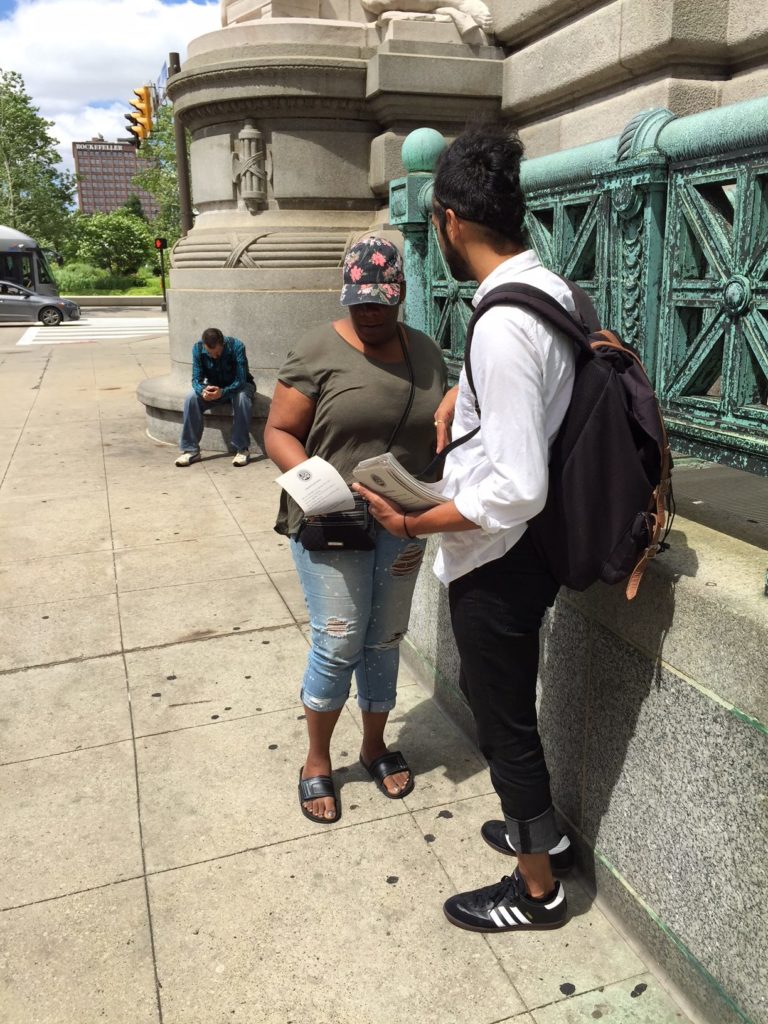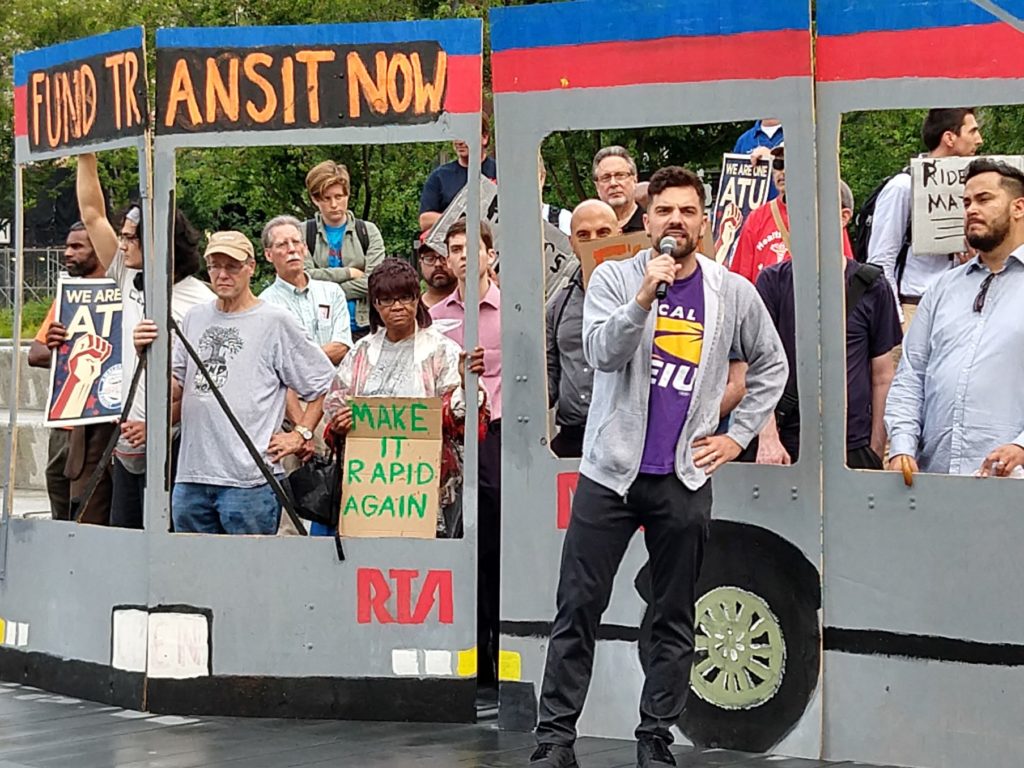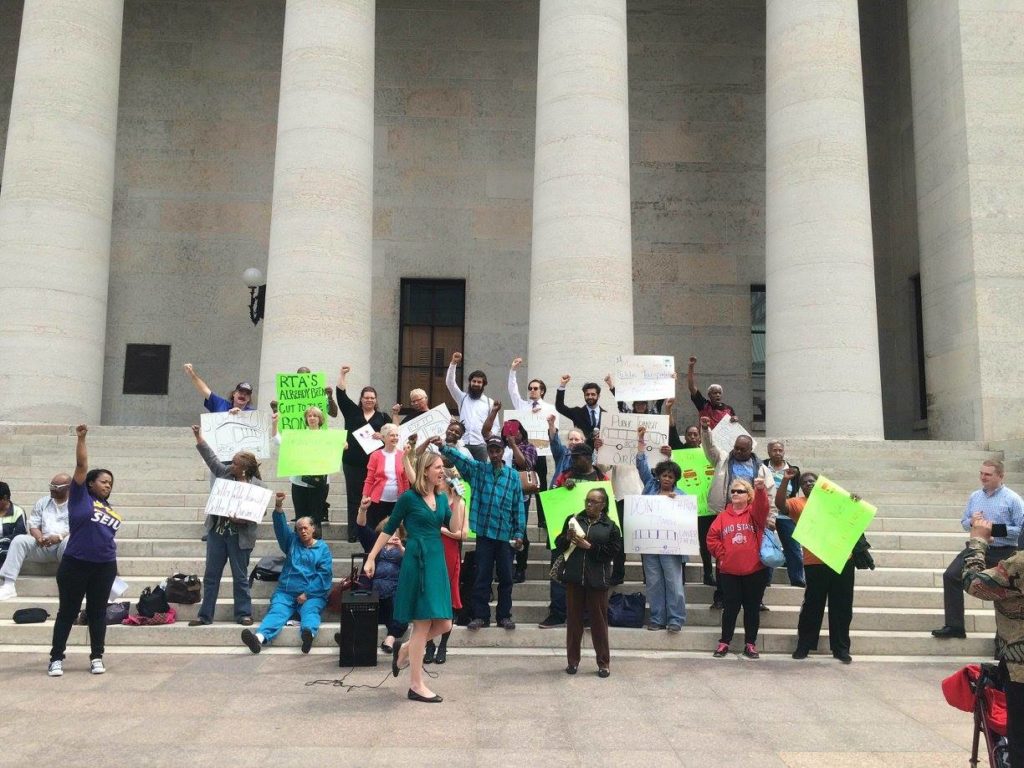By some measures Cleveland has one of the most expensive transit fares in the country. Even so, in 2015 the Regional Transit Authority—the agency in charge of Cleveland’s public transit system—proposed a 25-cent fare hike along with a 1.3% reduction in service. It was the latest in a series of tightening squeezes on riders to plug a yearslong decline in public funding for the system. “Since 2005 our transit fares have doubled while bus service has been cut by over 25%,” Chris Stocking, the treasurer and co-founder of Clevelanders for Public Transit, said. “Clevelanders are paying more and more for less and less service. We basically just said enough is enough.”
Around the same time of the fare hike proposal, funding for a collaborative that had been advocating for public transit alongside a slate of other environmental justice issues had run dry. That left a potential gap just as riders needed advocates most. So Chris and a group of volunteers decided to step up to keep fighting for public transit, bringing to life Clevelanders for Public Transit (CPT).

The idea of organizing transit riders isn’t necessarily a new one. Alliances and unions of riders exist in many major cities, and in some municipalities they even have a seat on transit agency boards. But this was a first for Cleveland. Few other organizations were advocating to expand transit rather than cut its funding. Fewer still, if any, were composed of the very people who relied on transit day-in and day-out.
“We have really unique bylaws,” Chris said. “Instead of being based on paying a membership fee, it’s about attending regular monthly riders meetings and voting to set our priorities.” Their meetings also happen after working hours, which helps ensure that money and time isn’t a limitation for riders, who form CPT’s 50 member or so backbone. That’s in part a nod to their organizational values—”by riders, for riders”—and in part a practicality. Up until a few months ago, CPT was an all-volunteer run operation, with rider-members doing everything from riding the trains and buses to conduct outreach, to keeping the thousands of supporters on their mailing list informed.
“A lot of our institutions that we have locally kind of failed us because no one was talking about more local transit funding before we came along,” Dana Beveridge, a former volunteer and CPT’s first paid staffer said. “But we also want to ask, well how are existing institutions set up? There’s really not a lot of similar groups in Cleveland where you can become a member just by participating. The democracy of our meetings and decision making actually have a meaningful impact. Our direct democracy was really intentional.”
Over the past few years, they’ve grown into a formidable force through their advocacy. That fare hike proposal in 2015 passed the following year, but even further hikes in 2018 and 2019 were blocked. When the transit authority’s board demurred on a proposed levy to expand transit until a new CEO was hired, CPT successfully pushed them to accelerate their hiring timeline and nudged them towards hiring a new leader more in tune with the needs of low- to mid-income riders.

It was all the more impressive that they achieved such gains as an all-volunteer organization, but they had limits. They couldn’t always have someone attend the Regional Transit Authority’s 9 am board meetings on work days, and with several wins under their belt they wanted to take their organizing to the next level. So earlier this year, they decided to hire their first staff person—someone to help organize members and committees, show up to RTA events when no one else could, and to help CPT start advocating for expansion rather than beating back cuts.
When they had difficulty finding funding opportunities for the role, they turned to crowdfunding with ioby as an alternative and found that it fit perfectly with their own organizing model. “Asking for a grant might be a little easier than crowdfunding but you’re not really building a base like you are with a mass campaign with lots of small donations,” Chris said. “It’s really inspiring to see different people throw in what they can. When you actually do grassroots fundraising and crowdsourcing you’re going to pull in new people in a way grants won’t.”
They tapped some existing donors to help create a match so that other donors could have their gifts doubled, a tactic proven to increase crowdfunding success. But at the end of the day, their success boiled down to good old fashioned face to face conversations. “We did social media and mass email of course. But you’re always going to be more successful when you can, one-on-one, tell someone why this is something that’s important to you. And along the way we were building power and building relationships,” Chris said.
They ultimately reached their goal and raised $4,882 to hire Dana Beveridge, a lawyer and former volunteer with CPT, as their first lead organizer. “It’s going to be huge,” Chris said. “For so long we’ve had to react. Now, we’ll get to be more proactive and start having a conversation about what more would look like. She can help give us a presence at day time meetings when our members are working and push there, bring her skill set as a lawyer to push for fare decriminalization, and really help put us on the offense.”

And their push is working. “Our main campaign right now is Fair Fares. It calls for things like reducing fares, but also things like fare capping,” Dana said. “A lot of people can’t afford a monthly pass upfront—$95 is a lot of money—so they pay for day passes or single use rides. That’s affordable in the shorterm, but if you do the math at the end of the month you overpay what you would’ve paid for a monthly pass.” So CPT pushed the transit authority to conduct a study on fares, which found that what CPT was saying was right—low-income people were either overpaying, or risked getting caught in the drag net of criminalization for simply being unable to afford a bus pass. CPT’s advocacy has led to a proposal in City Council to decriminalize and significantly reduce fines for fare evasion.
They’ve also nudged the board to consider a new levy to fund improvements and end the spiral of service cuts, fare increases, and dramatic ridership drops, and have started a discussion about joining a regional transit consortium to ease transfers between transit operators.
While CPT’s proposals might seem like common sense solutions, the reality is that their vision is a sweeping one. “Public transit is the issue we’re trying to solve here, but it’s very connected to all different aspects of life. The criminal justice system, how people get to work, where people can live, where people can go to school,” Dana said. Even the CEO of Cleveland’s public school system called out transit equity as a concern for kids’ education in the region.
At the very least, Chris says, they’re giving riders a voice they haven’t had in years. “The wins that CPT has gotten has really showed people that if you organize and get together, we can actually really make a change.”
Have an idea to strengthen your own community? We want to help! Let us know what your great idea is.